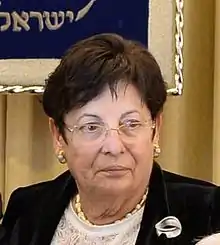Miriam Naor
Miriam Naor (Hebrew: מרים נאור; born October 26, 1947) was President of the Supreme Court of Israel from January 2015 to October 2017.[1] Naor retired at the end of October 2017 upon reaching the mandatory judicial retirement age of 70.[2] She was succeeded by Esther Hayut.[3]
Miriam Naor | |
|---|---|
 | |
| President of the Supreme Court of Israel | |
| In office 2015–2017 | |
| Deputy | Elyakim Rubinstein (2015–17) Salim Joubran (2017) |
| Preceded by | Asher Grunis |
| Succeeded by | Esther Hayut |
| Justice of the Supreme Court of Israel | |
| In office 2003–2015 | |
| Personal details | |
| Born | October 26, 1947 Jerusalem, Mandatory Palestine |
| Alma mater | Hebrew University of Jerusalem |
Early life
Miriam Naor was born in Jerusalem. Naor hails from a family rooted in the Revisionist Zionist tradition. Her husband, Aryeh Naor, served as Prime Minister Menachem Begin’s cabinet secretary from 1977 to 1982. Her mother-in-law, Esther Raziel-Naor, was a long-serving member of Knesset for Herut (the precursor to Likud) — from 1949 to 1973 and the sister of David Raziel. Her son Naftali — whose godfather was Menachem Begin — ran unsuccessfully in Likud primaries.
Career
Naor graduated from the Hebrew University’s law school in 1971 and clerked for Supreme Court justice (later Chief Justice) Moshe Landau. She worked on constitutional issues in the State Attorney’s Office under Mishael Cheshin, who would later be appointed Deputy Chief Justice.
In 1980 she won her first judicial appointment to the Jerusalem Magistrate’s Court. Later in the 1990s, she served as one of the judges who eventually convicted Shas chairman Aryeh Deri on bribery charges. She became a permanent justice on the Supreme Court in 2003.
Naor spent 38 years on the bench, 17 of them on the Supreme Court. Her final act was ratifying the verdict allowing Tel Aviv supermarkets and recreation centers to remain open on Shabbat.[4]
See also
References
| Legal offices | ||
|---|---|---|
| Preceded by Ayala Procaccia |
Chairman of the Central Elections Committee 2011–2012 |
Succeeded by Elyakim Rubinstein |
